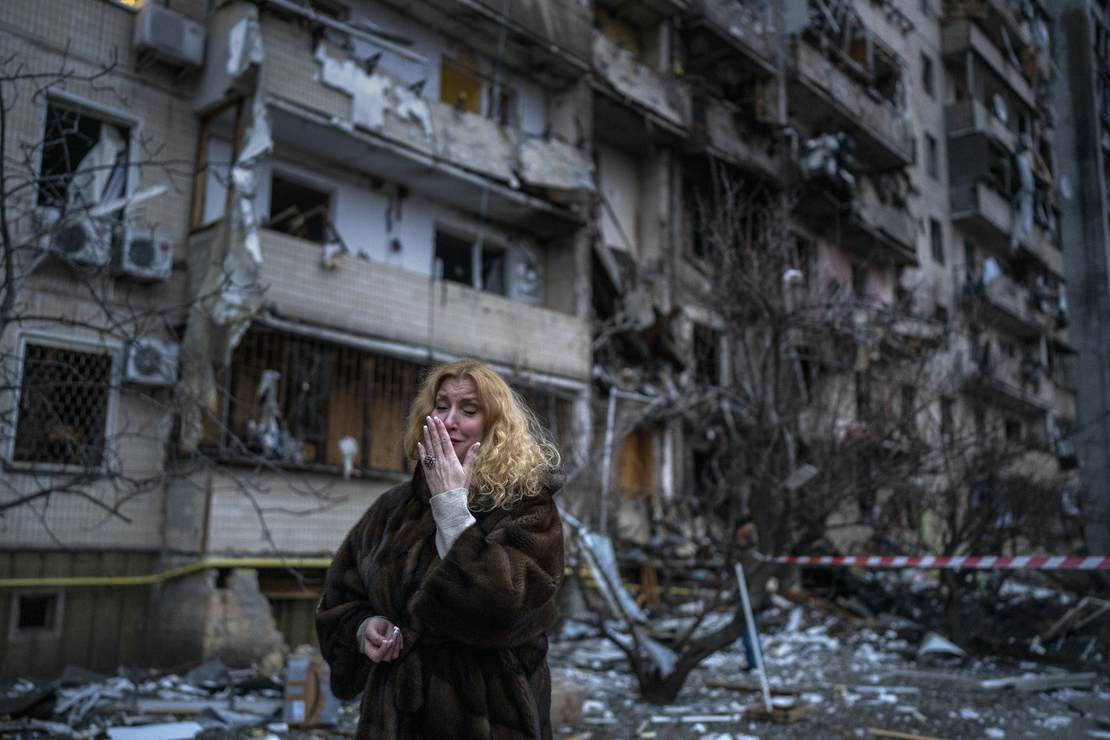
If they’d bomb a children’s hospital to try to break the Ukrainians, why wouldn’t they gas them in Kiev as well?
You know how it is with war crimes: In for a penny, in for a pound.
The warning about chemical weapons doesn’t appear to be based on hard intelligence, as the U.S. alerts last month about a Russian false-flag operation to trigger war with Ukraine were. This is more of an educated guess based on what we know of how Russia operates. If they’ve begun to chatter about the Ukrainians using WMD, it’s likely that they’re thinking of using WMD themselves and trying to pin it on Ukraine somehow.
That’s the Syrian playbook, after all, and Russia is quite familiar with Syria.
Worrisome:
#Konashenkov: 🇺🇦nationalists delivered about 80 tons of ammonia to Zolochiv settlement near #Kharkov. Residents from there say nationalists teached them how to act in a #chemical attack. Nationalists planning a provocation with toxins to accuse #Russia of using chemical weapons. pic.twitter.com/li4bURU9T7
— Russian Embassy, UK (@RussianEmbassy) March 9, 2022
Anything’s possible, but of the two parties to this conflict only one has recent experience liquidating its enemies with chemical agents. Fiona Hill reminded Politico of it recently when she was asked whether she thinks Putin is capable of going nuclear. Of course, she said. If he has a weapon and has calculated that it would do him more harm than good to use it, what would stop him? Basic decency?
He’s already used a nuclear weapon in some respects. Russian operatives poisoned Alexander Litvinenko with radioactive polonium and turned him into a human dirty bomb and polonium was spread all around London at every spot that poor man visited. He died a horrible death as a result.
The Russians have already used a weapons-grade nerve agent, Novichok. They’ve used it possibly several times, but for certain twice. Once in Salisbury, England, where it was rubbed all over the doorknob of Sergei Skripal and his daughter Yulia, who actually didn’t die; but the nerve agent contaminated the city of Salisbury, and anybody else who came into contact with it got sickened. Novichok killed a British citizen, Dawn Sturgess, because the assassins stored it in a perfume bottle which was discarded into a charity donation box where it was found by Sturgess and her partner. There was enough nerve agent in that bottle to kill several thousand people. The second time was in Alexander Navalny’s underpants.
If Russia intends to launch a WMD attack and blame Ukraine for it, presumably they’d eschew sophisticated, highly lethal chemical weapons like Novichok that would leave the Kremlin’s fingerprints on the incident. They might opt for something cruder, like a chlorine bomb or ammonia, as the Russian embassy suggested. After all, the point of a WMD attack wouldn’t necessarily be to kill en masse but to spread terror en masse, weakening the Ukrainians’ will to resist by implying that something worse could be next if they don’t quit.
Or maybe Russia would forgo chemical weapons and look to biological ones instead. They’ve been laying the groundwork for that lately too:
Russia tells the US “we have found your biological weapons. Their attempts, while spilling blood, to find biological & chemical weapons throughout the world. We have found your own products. We have found your biological material. As it turns out it was all happening in Ukraine.” pic.twitter.com/RFQk1OaDuZ
— DSimms 🍊 (@D_M_Simms) March 9, 2022
Andrew Weber, a nonproliferation expert, told Mother Jones that the alleged U.S. bioweapons labs in Ukraine are actually labs run by Ukraine’s department of health, “more or less equivalent to U.S. county health laboratories.” The labs did have some dangerous pathogens on the premises collected in the course of studying bacteria and viruses endemic to Ukraine but they allegedly destroyed those pathogens after the invasion precisely they feared the Russians would make mischief with them somehow, Weber claims.
He’s worried that the recent propaganda about “U.S. bioweapons” might be a pretext for a coming Russian biological attack. So is Marco Rubio, a member of the Senate Intelligence Committee:
Like I said a week ago, #Russia has been planning a CBW and/or nuclear false flag in #Ukraine
Well now #Putin govt is falsely reporting that Ukraine has rigged a reactor in #Kharkov
ANY NUKE,CHEMICAL OR BIOLOGICAL INCIDENT IN UKRAINE IS A RUSSIAN FALSE FLAG
READ RELATED: Delta passengers stranded at Atlanta airport for 24 HOURS after airline canceled and changed flights
— Marco Rubio (@marcorubio) March 7, 2022
So are western officials who spoke to reporters on background today:
In an assessment, they say an “utterly horrific” attack on Kyiv could be unleashed as Russian forces attempt to overcome the logistical issues that have apparently plagued the convoy heading for the city.
In a briefing to journalists, one official said: “I think we’ve got good reason to be concerned about possible use of non-conventional weapons, partly because of what we’ve seen has happened in other theatres.
“As I’ve mentioned before, for example, what we’ve seen in Syria, partly because we’ve seen a bit of setting the scene for that in the false flag claims that are coming out, and other indications as well.
“So it’s a serious concern for us.”
Late this afternoon, the White House itself alerted the public to the possibility that Russia is planning something:
This is preposterous. It’s the kind of disinformation operation we’ve seen repeatedly from the Russians over the years in Ukraine and in other countries, which have been debunked, and an example of the types of false pretexts we have been warning the Russians would invent.
— Jen Psaki (@PressSec) March 9, 2022
It’s Russia that has a long and well-documented track record of using chemical weapons, including in attempted assassinations and poisoning of Putin’s political enemies like Alexey Navalny.
— Jen Psaki (@PressSec) March 9, 2022
Now that Russia has made these false claims, and China has seemingly endorsed this propaganda, we should all be on the lookout for Russia to possibly use chemical or biological weapons in Ukraine, or to create a false flag operation using them. It’s a clear pattern.
— Jen Psaki (@PressSec) March 9, 2022
To give you a sense of how horrific a WMD attack could be, Weber estimates that the perfume bottle containing Novichok that was used to poison Sergei Skripal had enough lethal doses in it to kill 10,000 people. Ten thousand dead in the palm of your hand.
And this is where we may have gotten a bit ahead of ourselves in scrambling to wreck Putin’s economy. The reason the U.S. and Europe didn’t hit Putin with mega-sanctions immediately was because they were hoping he wouldn’t escalate by targeting all of Ukraine, confining himself to the disputed territory in the Donbas instead. We held back in the name of deterrence. Once it became clear that he wouldn’t be deterred, Russian finance was ruthlessly deplatformed by the west. But now we find ourselves having played most of our most serious deterrence cards while the Russian government is chattering about WMD.
Should a “red line” be drawn publicly by NATO declaring that any attacks involving weapons of mass destruction in Ukraine will be attributed to Russia? If it is, you know what the Kremlin will say: “NATO is incentivizing Ukraine to use WMD as a pretext for entering the war!”
I’ll leave you with this story from Rolling Stone about a name you might recognize from the somewhat recent past. Russians are already trying to pin their own attacks on the Ukrainians.
Pentagon spox John Kirby calls Russia’s accusations that Ukraine and the United States were developing bio-weapons “absurd” and “laughable,” adding that it’s “classic Russian propaganda.” pic.twitter.com/bNSvzdp4AS
— Justin Baragona (@justinbaragona) March 9, 2022
Source:





